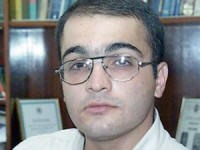|
KHOJALY: falsifications by eynulla fatullayev
Falsifications on Khojaly issue.
Eynulla Fatullayev and “The Karabakh Diary”
 One
of the favourite plots that Armenians occasionally resort to are the “materials”
by an Azerbaijani journalist Eynulla Fatullayev published in his own newspaper
“The Real Azerbaijan”. One
of the favourite plots that Armenians occasionally resort to are the “materials”
by an Azerbaijani journalist Eynulla Fatullayev published in his own newspaper
“The Real Azerbaijan”.
According to the Armenian side, Fatullayev lays all the blame for the killing
of innocent people on Azerbaijanis.
Basing on his observations and meetings during his visit to Armenia and the
occupied territories of Azerbaijan, Eynulla Fatulllayev has published “The
Karabakh Diary”.
Here we are mainly interested in the part of his papers where he wrote about
Khojaly. This chapter is the mostly cited one and referred to by Armenian
authors and websites.
There are three main statements highlighted in the content.
The first concerns the existence of the “escape route”.
The second is about the alleged talks with the Khodjaly refugees.
The third is devoted to the NFA*’s guilt in the killing of people.
We’ll consider these details and some other substantial ones, separately. Let
us remind the audience that Eynulla Fatullayev was just a 16-year old student at
that time. Neither he witnessed the Khodjaly events, nor took part in the
conflict.
So, the first statement about the existence of the “escape route”- this
matter was examined in detail in the course of the investigation conducted by
Memorial human rights group and the international organization Human Rights
Watch. Initiating the investigation right after the events, these agencies could
not ascertain the presence of the humanitarian corridor, moreover, the Armenian
side failed to submit any proof of the corridor, either. (Read more in the
chapter “Escape route”) In his work Fatullayev wrote the following regarding the
escape way: “…Having familiarized myself with the geographical area, I can say,
fully convinced, that the conjectures that there had been no Armenian corridor
are groundless. The corridor did indeed exist, otherwise the Khodjaly
inhabitants, fully surrounded [by the enemy troops] and isolated from the
outside world, would not have been able to force their way out and escape the
encirclement…” - It seems as if the journalist described some man-made object,
not the geographical area.
He supposes a version of the corridor non-existence a complete “conjecture”,
while the credible international organizations have come to conclusions
virtually contradicting Fatullayev’s statements. It should be mentioned that the
town was assaulted from three sides, the eastern side deliberately left free by
convention. According to the Armenian story, the “escape route” was located
exactly there. A great number of people, however, were killed right on this
direction.
The second statement by Fatullayev concerns the interviews allegedly taken
from the Khodjaly refugees and recorded on the tape. When asked to submit these
recordings, he couldn’t present a single one; furthermore, he failed
to mention the names of Khodjaly residents allegedly interviewed. The
refugees, in their turn, don’t remember anyone named Eynulla Fatullayev, who
supposedly interviewed them on a tape recorder.
In his work, Fatullayev referred to the refugees allegedly telling him of the
«humanitarian corridor”, but there were no evidence to prove the credibility of
those talks.
The third statement of Fatullayev touches upon the role of people from NFA
detachments defending the town. His words regarding their part are given below:
«However, having crossed the area behind the Kar-Kar River, the row of
refugees was separated and, for some reason, a group of [them] headed in the
direction of Nakhichevanik. It appears that the NFA battalions were striving not
for the liberation of the Khojaly civilians but for more bloodshed on their way
to overthrow A. Mutalibov.”
Fatullayev claims some soldiers from the battalions of the NFA had led part
of the refugees in the direction of the village of Nakhichevanik (where they
came under the hard fire by Armenians) which during that period had been under
the control of the Armenians' Askeran battalion. He perceives an evil intent
here and supposes that the soldiers had done that willfully. However, there
emerge two questions.
Question 1: Armenians firing indiscriminately, why did the NFA
battalions lead refugees to the place they would be surely shot at, together
with the civilians? If Fatullayev really holds them to be suicides, then that
must be proved, as well, which he failed to do.
Question 2: Why did Armenians fired at people reaching Nakhichevanik,
provided they didn’t intent to kill civilians?
Furthemore, Fatullayev didn’t mention the fire opened at the Khodjali
residents before Nakhichevanik, at the settlement of Kyatuk, where the first
hard fire was opened and refugees were taken captives.
Fatullayev states that after Nakhichevanik «…The other group of refugees
was hit by artillery volleys [while they were reaching] the [foot of the] Agdam
Region…» - here the author made a blatant error either by an oversight or
intentionally. The Agdam region is not located in an upland area, therefore, it
can’t be said “to have a foot”, either.
As to the artillery volleys mentioned, this version is marginal, too. The
footage from the scene of the tragedy spread all over the world and everyone can
find them on the Internet. If there had been any artillery salvo, there should
have been some shell holes formed on the ground. But there is not a single one
on the photos.
As we can see, “the confession by Eynulla Fatullayev” so much resorted to and
cited by Armenians, falls apart at the seams when thoroughly examined. A lot of
information can be submitted to prove that Fatullayev’s work is a pure coinage
in the gonzo journalism style. The chapter, however, considers not only
Fatullayev, but some other forgers, as well.
________________________________
*NFA- the National Front of Azerbaijan.
|
